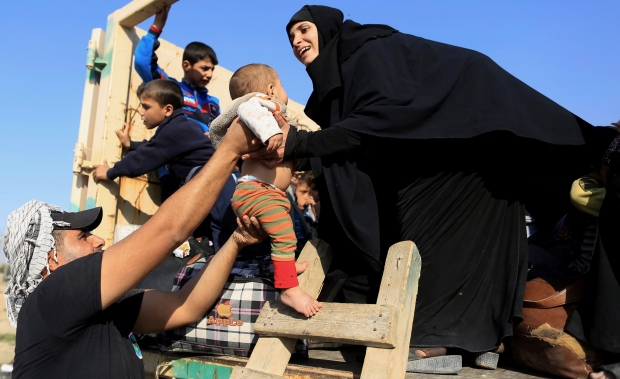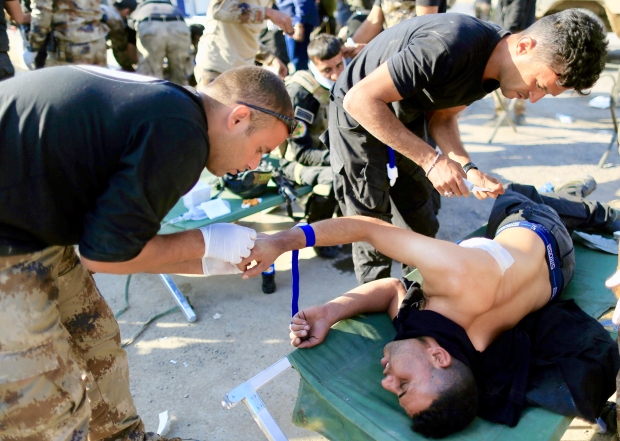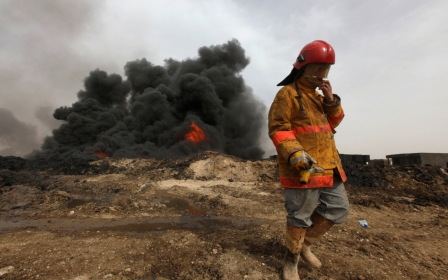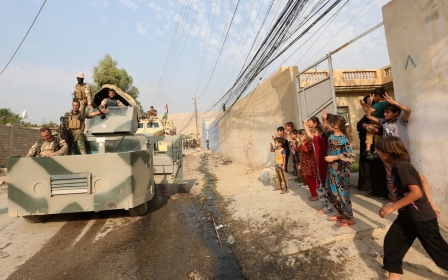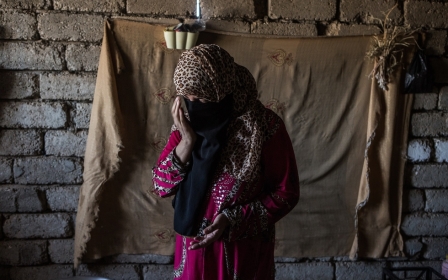Iraqi forces launch fresh Mosul assault as more civilians flee
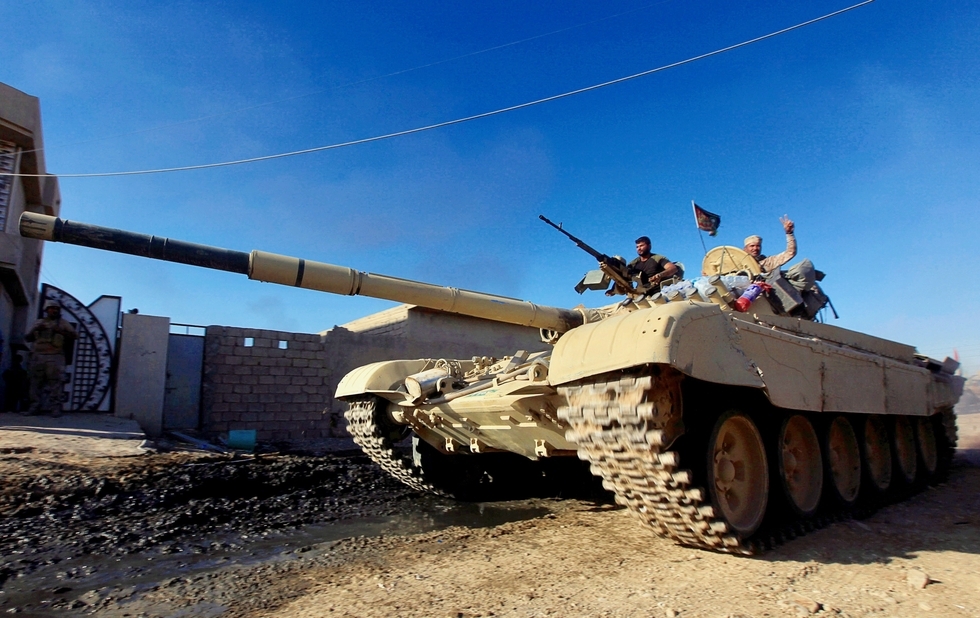
Iraqi special forces threw themselves back into battle on Saturday after a first foray into Mosul was blunted by stiffer than expected resistance from militants defending the birthplace of their "caliphate".
While the elite Counter-Terrorism Service (CTS) fought the Islamic State (IS) group in the streets of Mosul, the army and federal police attacked one of the last sizeable towns on the more distant southern front.
"Our forces are now engaged in fierce fighting inside the neighbourhoods of east Mosul," CTS spokesman Sabah al-Noman said, adding that the "fighting is house to house".
Recapturing Mosul would effectively crush the Iraqi half of the self-proclaimed caliphate declared by IS leader Abu Bakr al-Baghdadi from the pulpit of a Mosul mosque two years ago. His group also controls large parts of east Syria.
The mass exodus feared by aid groups of some of the million-plus civilians still trapped in Mosul has yet to materialise, but the number of people displaced by the battle has grown sharply in recent days.
In Bartalla, a town to the east that Iraqi forces have used as a base since retaking it in the early days of the nearly three-week-old offensive, ambulances returning from the front with wounded CTS fighters rushed by on a regular basis.
CTS forces made their first real push into the streets of Mosul on Friday but were met by a deluge of bombs and gunfire, and were eventually forced into a partial pullback after a few hours.
"We weren't expecting such resistance. They had blocked all the roads," said one officer. "There are large numbers of jihadists ... It was preferable to pull back and devise a new plan."
The hitch in the CTS advance appeared to contradict reports that IS had moved its resources away from the east of Mosul to the west bank of the River Tigris.
The militant group had looked increasingly pragmatic when vastly outnumbered and outgunned in recent months, sometimes giving up emblematic bastions almost without a fight.
Some of the 3,000 to 5,000 militants estimated to be inside the city may have been galvanised by a rare message from their leader, Abu Bakr al-Baghdadi, on Thursday.
Baghdadi released an audio recording for the first time in almost a year, urging his fighters not to retreat.
Federal forces on the southern front attacked Hamam al-Alil, one of the main towns between their staging base in Qayyarah and Mosul.
"Army and federal police forces are attacking Hamam al-Alil from three sides with the support of army aviation," Staff Lieutenant General Abdulamir Yarallah said in a statement released by Joint Operations Command.
Saturday's attack on Hammam al-Alil, about 15km south of Mosul, targeted a force of at least 70 Islamic State militants in the Tigris river town, the commander of the Mosul operations, Major-General Najm al-Jabouri, said.
Jabouri said the assault began at about 10am (0700 GMT) and some militants had tried to escape across the river, although others put up heavy resistance and the troops had thwarted three attempted suicide car bombings.
The battle “is very important. It's the last town for us before Mosul," Jabouri told reporters. Iraqi helicopters were supporting the army, he said, backed also by jets from a US-led air coalition which had been hitting IS targets in the town for several days.
A military statement said security forces had raised the Iraqi flag over a government building in the town, but it did not say whether it was fully under their control.
Jabouri said a man he described as a senior IS figure, Ammar Salih Ahmed Abu Bakr, was killed by federal police - who are fighting with the army in Hammam al-Alil - as he tried to escape by car.
Many of the remaining militants were non-Iraqis, he said. "There are at least 70 Daesh [IS] fighters in the town. The majority are foreign fighters, so they don't know where to go. They are just moving from place to place."
The army and accompanying security forces aim to push the southern front up to Mosul to join troops and special forces that broke into the city's east this week, taking six districts and carving out a foothold in the militants' Iraq bastion.
Forces working their way up the Tigris Valley have had more distance to cover than those on other fronts since Iraq launched the operation to retake Mosul on 17 October.
While the corridors called for by aid groups to allow the safe passage of civilians have yet to materialise, the number of arrivals in the displacement camps dotting the area has increased markedly.
The Ministry of Displacement and Migration said it had taken in 9,000 displaced people during the past two days.
It put the total number of Iraqis displaced into camps since the start of the operation at 29,539.
Relief organisations were fighting the clock to build up their shelter capacity ahead of the feared mass exodus from Mosul.
In a camp east of Mosul, displaced Iraqis are living a Spartan existence.
"They gave us blankets, but it's not enough and the weather is very cold. We are 19 inside this tent," said Yunes Hassan, 53.
Another man said services were lacking and the food insufficient.
"When I bring a plate of food, all my kids are fighting to eat it," 30-year-old Ahmed said.
Still, they are still free of IS: "Here, we and our kids can sleep until the morning. It's not like back home, where we couldn't sleep. We were always scared," 51-year-old Abu Osama said.
Despite complaints from Iraqi forces on the ground that the number of air strikes has been insufficient, the US-led coalition insists it is providing more intense and sustained air support than ever before in its two-year campaign against IS.
Brett McGurk, US President Barack Obama's envoy to the coalition, hailed the latest military developments in a message on social media.
"New advances on all axes. Ways to go, but ahead of schedule," he said.
US and other commanders have warned that the offensive could take weeks or months.
Iraqi Prime Minister Haider al-Abadi, who has visited the front lines several times since the offensive started, has vowed to rid the country of IS by the end of the year.
Abadi, speaking on a visit to the eastern battle front, said he brought "a message to the residents inside Mosul who are hostages in the hands of Daesh - we will liberate you soon".
Abadi said progress in the nearly three-week-old campaign and the advance into Mosul itself had been faster than expected. But in the face of fierce resistance, which has included suicide car bombings, sniper fire and roadside bombs, he suggested that progress may be intermittent.
"Our heroic forces will not retreat and will not be broken. Maybe in the face of terrorist acts, criminal acts, there will be some delay," he said.
New MEE newsletter: Jerusalem Dispatch
Sign up to get the latest insights and analysis on Israel-Palestine, alongside Turkey Unpacked and other MEE newsletters
Middle East Eye delivers independent and unrivalled coverage and analysis of the Middle East, North Africa and beyond. To learn more about republishing this content and the associated fees, please fill out this form. More about MEE can be found here.


